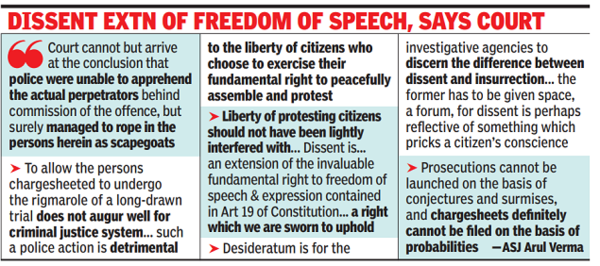Coming heavily against the police, the court said there was no evidence that the defendants were part of a conspiracy and acted in tandem or participated in mob violence or even used weapons or threw stones. He said proceedings cannot be brought on the basis of “conjecture and guesswork” and charges cannot be filed on the “basis of probability”.
Additional Sessions Judge Arul Verma criticized the police for filing an “ill-conceived” charge sheet, adding that their case was “lacking irrefragable evidence”. In acquitting 11 of the 12 defendants, the judge noted: “By mixing the facts as evidenced by an examination of the charge sheet and three additional charge sheets, this court can only come to the conclusion that the police were unable to arrest the actual perpetrators behind the commission of the crime, but surely he managed to tie people here as scapegoats.”

Upholding a citizen’s right to protest, the judge noted: “The liberty of Protestant citizens should have been lightly interfered with. It would be pertinent to point out that dissent is but an extension of the invaluable fundamental right to freedom of speech and expression.” expression contained in 19 of the Indian Constitution, subject to the restrictions contained therein. It is therefore a right we are committed to defending. This Court has a duty to lean towards an interpretation that protects the rights of the defendant, given the omnipresent power disparities between them and the state machine”.
“The desidetum is for investigative agencies to discern the difference between dissent and insurrection. The latter must be unquestionably repressed. However, the former must be given space, a forum, because dissent is perhaps a reflection of something that pricks the conscience of a citizen,” the court noted.
Describing the late recording of witness statements, nearly a year after the incident, as “equally strange,” the court noted that even after identifying one Bilal Ibnu Shahul in the crowd, the police did not make him a defendant but a witness policeman.
“It is evident that the police have arbitrarily chosen to classify some people from the mob as accused and others from the same mob as police witnesses. This cherry-picking by the police is detrimental to the precept of fairness,” the judge said.

2019 Jamia violence case: Delhi court dismisses Sharjeel Imam, Asif Iqbal Tanha
Stating that the answer to the question of whether the accused persons were also prima facie accomplices in taking part in the chaos was “an unequivocal no”, the court stated that there was no prima facie evidence that the accused objected to the execution of no law.
Noting that all the defendants allude to the fact that, despite being present on the spot, they were not part of the illicit assembly, the judge affirmed that no obvious act or participation in the commission of crimes was attributed to them.
“There are no eyewitnesses who can confirm the police version that the accused persons were nevertheless involved in the commission of the crimes,” the court said.
The FIR has been registered against the defendant for the alleged crimes referred to in articles 143 (abusive gathering), 147 (riot) 148 (riot armed with a deadly weapon), 149 (each member of the abusive gathering is guilty of a crime committed in the pursuit of a common object), 186 (obstructing a public official in the performance of public functions), 353 (aggression or criminal force to dissuade a public official from fulfilling his duties), 332 (voluntary injury to dissuade a public official from ), 333 (intentional serious offense to dissuade public employee from his office), 308 (attempted manslaughter), 427 (malice causing damage to the amount of fifty rupees), 435 (malice involving fire or explosive substance with the intent to cause damage to the amount of fifty rupees), hundred or (in case of agricultural products) ten rupees, 323 (punishment for willfully causing harm), 341 (punishment for wrongful imprisonment), 120B (criminal conspiracy) and 34 (acts committed by several persons in support of a common intention) of the CPI.
“It goes without saying that the detective agency is not precluded from conducting further investigations in a fair manner, with the permission of the court, in order to bring the actual perpetrators to the record, with the exhortation not to blur the lines between dissidents and rioters and desist from the charge henceforth innocent protesters,” the court said.
Noting that the prosecution had been initiated in a “perfunctory and dismissive” manner against the accused persons, except Mohammad Ilyas, alias Allen, the court said that the investigative agencies should have incorporated the use of technology, or gathered credible information, and then only he was supposed to “embark on galvanizing the justice system.”
Interestingly, the main complaint was filed against Mohammad Ilyas on 21 April 2020, following which a supplementary complaint was also filed against him. Subsequently, a second supplementary complaint was filed against the other 11 defendants, namely Mohammad Qasim, Mahmood Anwar, Shahzar Raza KhanMohd Abuzar, Mohd Shoaib, Umair AhmadBilal Nadeem, Sharjeel Imam, Asif Iqbal Tanha, Chanda Yadav and Safoora Zargar.
